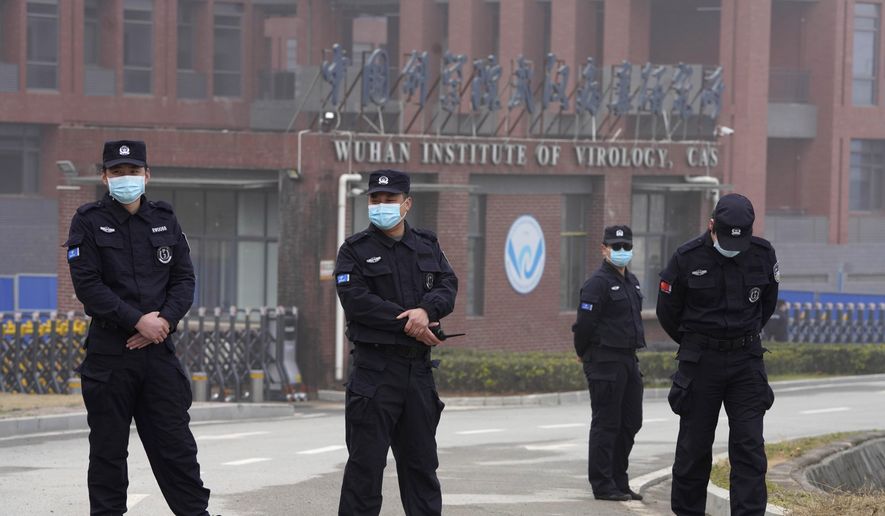The federal government missed warning signs from the lab at the center of the coronavirus controversy, allowing U.S. money to flow to the Wuhan Institute of Virology without adequate oversight of what the Chinese scientists were doing, an inspector general reported Wednesday.
The National Institutes of Health funded the EcoHealth Alliance, a New York-based nonprofit, which in turn sent money to Wuhan for research on emerging viruses. NIH ordered EcoHealth to keep a close eye on the research and to report back if there were signs that the research was producing “enhanced growth” of deadly viruses.
Wuhan crossed that line but EcoHealth failed to raise the alarm, the Health and Human Services Department’s inspector general said.
The new report does not conclude that the coronavirus emerged from the Wuhan lab and does not tie U.S. funding to the virus. But the audit does say the federal government was sending money over without adequate controls on how it was being spent.
“Despite identifying potential risks associated with research being performed under the EcoHealth awards, NIH did not effectively monitor or take timely action to address EcoHealth’s compliance with some research requirements,” the inspector general concluded.
Even now, the National Institutes of Health still can’t say exactly what Wuhan was doing with American taxpayers’ money in 2019, just before the coronavirus pandemic struck. That’s because the lab has stopped responding to U.S. requests.
The report said EcoHealth should clean up its monitoring and reporting before the U.S. pays the outfit any more money.
The audit also said HHS should order EcoHealth to refund nearly $90,000 in money the group spent on items beyond the scope of the agreement.
Sen. Joni Ernst, the Iowa Republican who requested the audit, said it’s time to cut off all taxpayer money from EcoHealth.
“While NIH certainly shares in the blame, EcoHealth Alliance is ultimately at fault for failing to tell the world what was really going on at China’s Wuhan Institute,” she said. “They are guilty of either complacency or a cover-up, or maybe a little of both.”
She added: “EcoHealth was paid millions, promising their hunt for bat viruses would protect the world from a pandemic … Well, the world got a pandemic, and EcoHealth keeps getting millions.”
Since the start of the pandemic, EcoHealth has continued to win contracts from Uncle Sam, she said — including a new $3 million award from the Pentagon last month.
Some Republicans said the new report shows that NIH needs its own inspector general dedicated to policing the research giant’s spending.
“NIH continues to act as an autonomous government agency and forego policies that strictly regulate the grant award process,” said Sen. Roger Marshall, Kansas Republican. “The agency’s lack of grant oversight and management jeopardizes the integrity of federally funded research and leaves Americans vulnerable to dangerous pathogen outbreaks from lab accidents.”
Both NIH and EcoHealth told the inspector general they have taken steps to improve their monitoring and reporting.
But EcoHealth disputed the finding that it didn’t alert NIH that the research in Wuhan had crossed lines in terms of virus growth. For one thing, EcoHealth said it wasn’t clear what NIH meant by requiring EcoHealth to “immediately notify” of signs that virus research had turned more dangerous. EcoHealth also said it did raise the issue in one of its yearly reports.
The inspector general said that didn’t qualify as an immediate notification.
EcoHealth also bristled at being dinged for Wuhan’s refusal to turn over research NIH has requested, suggesting it was NIH who blew all leverage with Wuhan by canceling its money in early 2020, then months later asking for the lab to divulge its work. The ensuing pandemic also didn’t help grease the skids for cooperation.
“These conditions and particularly the political tensions between the Chinese and U.S. governments at the time effectively shut down communications among scientists at the WIV (a Chinese government laboratory) and EcoHealth Alliance staff, making it impossible for EcoHealth Alliance to secure the requested data,” said Peter Daszak, EcoHealth’s president, in an official response to the audit.
The inspector general acknowledged those roadblocks but said EcoHealth was required by federal regulations to ensure access to Wuhan’s research.
EcoHealth was trying to keep tabs. The audit found its staff met with lab personnel at least 20 times between June 2014 and December 2019. That included annual visits to Wuhan.
But EcoHealth bungled its funding agreement with Wuhan, leaving out required information and failing to get Wuhan to report on what it was doing in the latter years of the project.
EcoHealth agreed to return some money the inspector general said was improperly paid — but the outfit said it also discovered another $126,391 it should have been paid. EcoHealth said it is asking Uncle Sam to pay up.
The audit revealed bizarre levels of bureaucratic bungling.
EcoHealth was supposed to submit a progress report each year. In 2019, the fifth year of the five-year grant, EcoHealth said it tried to upload a report to NIH’s system but was locked out of the file apparently because NIH had already approved a new five-year renewal.
NIH didn’t flag the unfiled report and EcoHealth didn’t alert NIH to the problem, figuring that the renewal signaled NIH’s ongoing satisfaction with what the outfit was doing.
Investigators said the report would eventually be filed in August 2021 — more than two years after it was supposed to have been submitted, and more than a year after the pandemic washed over the globe.
• Haris Alic contributed to this report.
For more information, visit The Washington Times COVID-19 resource page.
• Stephen Dinan can be reached at sdinan@washingtontimes.com.




Please read our comment policy before commenting.